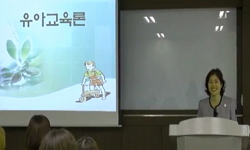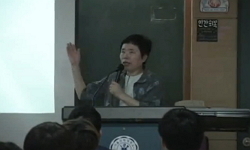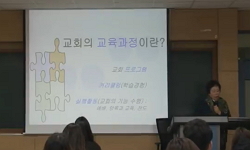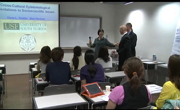An outcome-based curriculum is perceived to be one alternative educational approach in medical education. Nonetheless, it is difficult for curriculum developers to convert from traditional curriculum to an outcome-based curriculum because research doc...
http://chineseinput.net/에서 pinyin(병음)방식으로 중국어를 변환할 수 있습니다.
변환된 중국어를 복사하여 사용하시면 됩니다.
- 中文 을 입력하시려면 zhongwen을 입력하시고 space를누르시면됩니다.
- 北京 을 입력하시려면 beijing을 입력하시고 space를 누르시면 됩니다.
https://www.riss.kr/link?id=A102076145
-
저자
안재희 (연세대학교) ; 양은배 (연세대학교) ; Ahn, Jae Hee ; Yang, Eunbae B.

- 발행기관
- 학술지명
- 권호사항
-
발행연도
2013
-
작성언어
Korean
- 주제어
-
등재정보
KCI등재
-
자료형태
학술저널
-
수록면
9-18(10쪽)
-
KCI 피인용횟수
8
- DOI식별코드
- 제공처
-
0
상세조회 -
0
다운로드
부가정보
다국어 초록 (Multilingual Abstract)
An outcome-based curriculum is perceived to be one alternative educational approach in medical education. Nonetheless, it is difficult for curriculum developers to convert from traditional curriculum to an outcome-based curriculum because research documenting its development process is rare. Therefore, this study aims to introduce the development process and method of outcome-based curriculum. For the purpose of this study, we used diverse data analyses, such as an existing literature search, development model analysis, and case analysis. We identified five phases from the analysis. First, the curriculum developers analyze the physician's job or a high performer in a medical situation. Second, curriculum developers extract outcomes and competencies through developing a curriculum, affinity diagraming, and critical incident interviews. Third, curriculum developers determine the proficiency levels of each outcome and competency evaluation methods. Fourth, curriculum developers conduct curriculum mapping with outcomes and competencies. Fifth, curriculum developers develop an educational system. Also, it is important to develop an assessment system for the curriculum implementation in the process of developing the outcome-based curriculum. An outcome-based curriculum influences all the people concerned with education in a medical school including the professors, students, and administrative staff members. Therefore, curriculum developers should consider not only performance assessment tools for the students but also assessment indicators for checking curriculum implementation and managing curriculum quality.
참고문헌 (Reference)
1 채수진, "학습성과중심교육과정에서의 교육과정 설계 탐색" 연세대학교 의과대학 11 (11): 3-9, 2009
2 박성종, "컴피턴시 중심 교육 관점에서의 공학기술 교육과정 개발" 한국직업능력개발원 7 (7): 55-76, 2004
3 강경종, "직업기초능력 함양을 위한 전문대학 교양 교육과정 개발 방안" 한국직업교육학회 22 (22): 79-113, 2003
4 오은주, "중소기업에서 요구되는 직업역량과 역량기반 교육과정 개발" 한국콘텐츠학회 12 (12): 517-531, 2012
5 이재경, "역량 기반 교육과정 개발 방법론에 대한 고찰:마케팅 역량 강화 교육과정 체계 개발 사례를 중심으로" 한국교육공학회 18 (18): 25-56, 2002
6 Winchester-Seeto, T., "Will students notice the difference? embedding graduate capabilities in the curriculum" 509-518, 2009
7 Kim, P. O., "The understanding and development of competency-based curriculum" Yangsewon 2010
8 Rhee, B. D., "The process of developing a clinical presentation curriculum" 32 (32): 8-16, 2012
9 Ministry of Public Administration and Security, "The competency assessment for a scientific human management" Ministry of Public Administration and Security 2008
10 Miller, G. E., "The assessment of clinical skills/competence/performance" 65 (65): S63-S67, 1990
1 채수진, "학습성과중심교육과정에서의 교육과정 설계 탐색" 연세대학교 의과대학 11 (11): 3-9, 2009
2 박성종, "컴피턴시 중심 교육 관점에서의 공학기술 교육과정 개발" 한국직업능력개발원 7 (7): 55-76, 2004
3 강경종, "직업기초능력 함양을 위한 전문대학 교양 교육과정 개발 방안" 한국직업교육학회 22 (22): 79-113, 2003
4 오은주, "중소기업에서 요구되는 직업역량과 역량기반 교육과정 개발" 한국콘텐츠학회 12 (12): 517-531, 2012
5 이재경, "역량 기반 교육과정 개발 방법론에 대한 고찰:마케팅 역량 강화 교육과정 체계 개발 사례를 중심으로" 한국교육공학회 18 (18): 25-56, 2002
6 Winchester-Seeto, T., "Will students notice the difference? embedding graduate capabilities in the curriculum" 509-518, 2009
7 Kim, P. O., "The understanding and development of competency-based curriculum" Yangsewon 2010
8 Rhee, B. D., "The process of developing a clinical presentation curriculum" 32 (32): 8-16, 2012
9 Ministry of Public Administration and Security, "The competency assessment for a scientific human management" Ministry of Public Administration and Security 2008
10 Miller, G. E., "The assessment of clinical skills/competence/performance" 65 (65): S63-S67, 1990
11 Cumming, A. D., "The Tuning Project (medicine): learning outcomes/competences for undergraduate medical education in Europe"
12 Frank, J. R., "The CanMEDS initiative : implementing an outcomes-based framework of physician competencies" 29 (29): 642-647, 2007
13 Association of American Medical Colleges, "Report II contemporary issues in medicine: medical informatics and population health" Association of American Medical Colleges 1998
14 Harden, R. M., "Outcome-based education : the ostrich, the peacock and the beaver" 29 (29): 666-671, 2007
15 McNeir, G., "Outcome-based education" 85 : 3-5, 1993
16 Davis, M. H., "Outcome-based education" 30 (30): 227-232, 2003
17 Spady, W. G., "Organizing for results : the basis of authentic restructuring and reform" 46 (46): 4-8, 1988
18 University of Dundee, "Learning medicine in Dundee"
19 Briscoe, J. P., "Grooming and picking leaders using competency frameworks: do they work? an alternative approach and new guidelines for practice" 28 (28): 37-52, 1999
20 Dreyfus, S. E., "Four models v human situational understanding: inherent limitations on the modelling of business expertise" USAF Office of Scientific Research 1981
21 Foster, M. R., "Effective job analysis methods, In Handbook of human resource management in government" Jossey-Bass 1998
22 Choi, W., "Development cases of a course structure in corporate training program : a comparison between DACUM and CBC" 18 (18): 91-121, 2002
23 Kim, J. M., "Developing a curriculum centered on competency for developing the human resources of an enterprise" 20 (20): 109-128, 2001
24 Norton, R. E., "DACUM handbook" Ohio State University, Center on Education and Training for Employment 1997
25 Lee, H. M., "Competency modeling & competency evaluation" Readlead 2009
26 Rothwell, W. J., "Competency identification, modelling and assessment in the USA" 3 (3): 90-105, 1999
27 Yoon, Y. S., "Cases of motorola university and LG electronics : developing competency-based curriculum in corporate education" 1 (1): 103-123, 1998
28 Davis, M. H., "Case studies in outcome-based education" 29 (29): 717-722, 2007
29 Harden, R. M., "Assessment of clinical competence using an objective structured clinical examination(OSCE)" 13 : 41-54, 1979
30 Ben-David, M. F., "AMEE guide no. 14: outcome-based education: part 3-assessment in outcome-based education" 21 (21): 23-25, 1999
31 Harden, R. M., "AMEE guide no. 14 : outcome-based education : part 5-from competency to meta-competency : a model for the specification of learning outcomes" 21 (21): 546-552, 1999
32 Smith, S. R., "AMEE guide no. 14 : outcome-based education : part 2-planning, implementing and evaluating a competency-based curriculum" 21 (21): 15-22, 1999
33 Harden, R. M., "AMEE guide no. 14 : outcome-based education : part 1-an introduction to outcome-based education" 21 (21): 7-14, 1999
34 Lee, J. S., "A study on competency based curriculum development for vocational high school and junior college in Korea" Korea Research Institute for Vocational Education & Training 2001
동일학술지(권/호) 다른 논문
-
- 연세대학교 의과대학
- 김복기
- 2013
- KCI등재
-
Gender in Medical Training and Academic Medicine
- Yonsei university college of medicine
- Lee, Hak-Seung
- 2013
- KCI등재
-
- 연세대학교 의과대학
- 한재진
- 2013
- KCI등재
-
- 연세대학교 의과대학
- 임선주
- 2013
- KCI등재
분석정보
인용정보 인용지수 설명보기
학술지 이력
| 연월일 | 이력구분 | 이력상세 | 등재구분 |
|---|---|---|---|
| 2027 | 평가예정 | 재인증평가 신청대상 (재인증) | |
| 2021-01-01 | 평가 | 등재학술지 유지 (재인증) |  |
| 2018-01-01 | 평가 | 등재학술지 유지 (등재유지) |  |
| 2015-01-01 | 평가 | 등재학술지 선정 (계속평가) |  |
| 2014-04-08 | 학회명변경 | 한글명 : 연세대학교 의과대학 의학교육학과 -> 연세대학교 의과대학영문명 : Yonsei University College of Medicine, Dept. of Medical Education -> Yonsei University College of Medicine |  |
| 2014-01-09 | 학술지명변경 | 외국어명 : 미등록 -> Korean Medical Education Review |  |
| 2013-01-01 | 평가 | 등재후보 1차 FAIL (등재후보1차) |  |
| 2012-01-01 | 평가 | 등재후보학술지 유지 (기타) |  |
| 2010-01-01 | 평가 | 등재후보학술지 선정 (신규평가) |  |
학술지 인용정보
| 기준연도 | WOS-KCI 통합IF(2년) | KCIF(2년) | KCIF(3년) |
|---|---|---|---|
| 2016 | 0.29 | 0.29 | 0.26 |
| KCIF(4년) | KCIF(5년) | 중심성지수(3년) | 즉시성지수 |
| 0.34 | 0.32 | 0.595 | 0.22 |




 ScienceON
ScienceON






